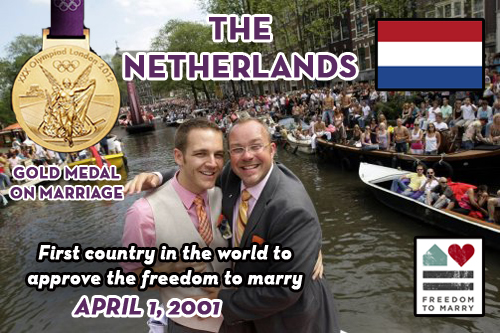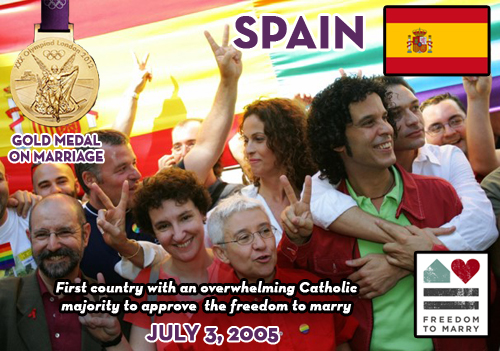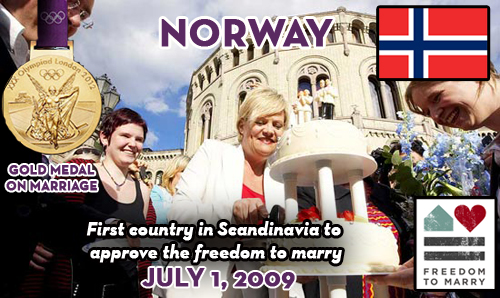Olympics Spotlight: Which countries are ‘gold medal’ on marriage?
August 01, 2012
The Olympic Games are one of the few occasions in our world that are truly global, bringing together people from every country to support each other and understand our connections across the globe. It's also a time to reflect on international support for the freedom to marry, and celebrate countries where same-sex couples have had the freedom to marry for months, years, or in the case of the Netherlands, an entire decade. Here, we take a look at seven countries that win the figurative "gold medal on marriage." Read all about the 11 countries with the freedom to marry nationwide (and 3 additional countries with regional access to marriage for same-sex couples) on our International page.

The Netherlands' Parliament was the first in the world to end the exclusion of same-sex couples from marriage in 2001, voting 107-33 to eliminate discrimination from their marriage laws. Last year, the country celebrated the 10-year anniversary of the freedom to marry taking effect. 15,000 same-sex couples married in that time, representing 20 percent of the country's gay and lesbian couples. Statistics Netherlands' Jan Latten spoke with Radio Netherlands back in April 2011 about how the Dutch understand that same-sex couples have the same values and motivations for marrying as different-sex couples. He said, "Many of them marry out of love, of course. But, just as with straight couples, the desire to have children and the resulting legal responsibilities often weigh even more for gay and lesbian couples to marry."

Although Belgium and the Netherlands feature large Catholic populations, both countries were decidedly secular when they approved the freedom to marry, so it was a huge step forward when the legislature of Spain, with over a 70 percent majority of Catholics, passed marriage for all couples. Despite some opposition from the Catholic Church, a majority of Spaniards - 66 percent, according to one poll -supported the measure, and the Parliament voted 187 to 147 in favor of the freedom to marry. In July 2012, after some speculation about repealing the freedom to marry from Spain's new president, the country's Constitutional Court reaffirmed that the freedom to marry was constitutional and ruled that it could not be repealed.

On June 28, 2005, the House of Commons in Canada passed the Civil Marriage Act, which was then passed by the Senate on July 19. The Civil Marriage Act, which received Royal Assent on July 20, provided a gender-neutral definition of marriage. The national legislation passed after more than three quarters of Canadian provinces and territories legalized same-sex unions through the provincial judicial system, amounting to 3,000 marriages between same-sex couples in those areas. Despite some uproar last year over the country's new Conservative government threatening to annul all marriages between same-sex couples, the marriage law will not be reversed and same-sex couples - from Canada, from the United States, or otherwise - will continue to be allowed to marry there.

The post-apartheid constitution in South Africa outlawed discrimination of people based on sexual orientation, but it wasn't until 2006 that the country officially approved the freedom to marry. Prior to the vote in Parliament, Defense Minister Mosiuoa Lekota spoke passionately about the importance of the freedom to marry, saying, "We are bound to fulfil the promises of democracy which we made to the people of our country. Are we going to suppress this so-called minority, or are we going to let these people enjoy the privilege of choosing who will be their life partners?"

On June 11, 2008, members of Parliament in Norway approved a gender-neutral bill that ended the exclusion of same-sex couples from marriage by a vote of 84-41. Anniken Huitfeldt, the Minister of Children and Equality, applauded the law, saying, "Letting gay couples marry won't weaken marriage as an institution; rather, it will strengthen it. Marriage won't be worth less because more can take part in it."

On June 11, 2010, Iceland’s parliament unanimously voted, 49 to 0, to end the exclusion of same-sex couples from marriage. Iceland has been typically progressive on LGBT issues - in 2009, they became the first country in the world to elect an openly gay head of state when they chose Johanna Sigurdardottir, a fierce proponent of the marriage law, as prime minister.

Argentina became a beacon for the freedom to marry in Latin America when the largely Catholic country approved marriage for all couples officially on July 22, 2010. It gives same-sex couples the same rights and protections as different-sex couples, including the ability to adopt. The law was backed by the government of President Cristina Fernández de Kirchner, who signed the measure into law after majority approval from the country's legislative bodies.
Read all of our Olympics coverage: